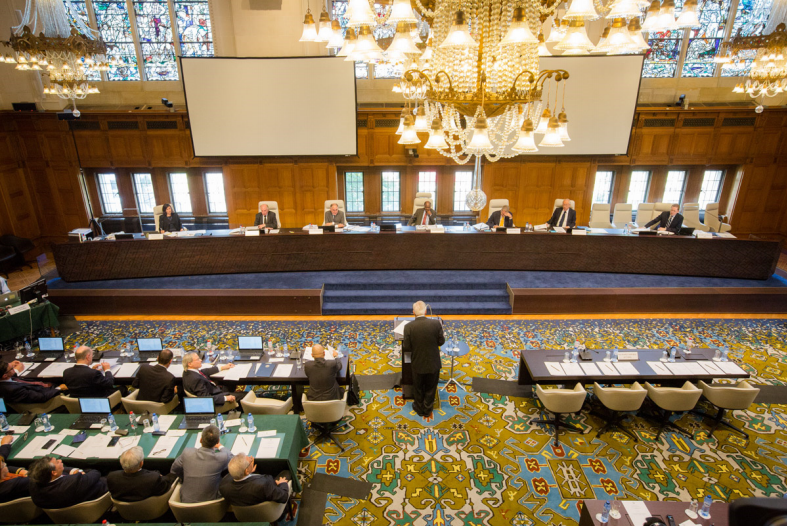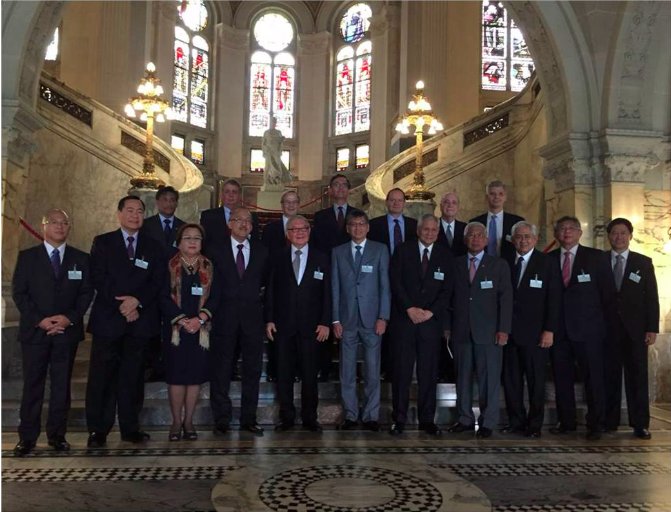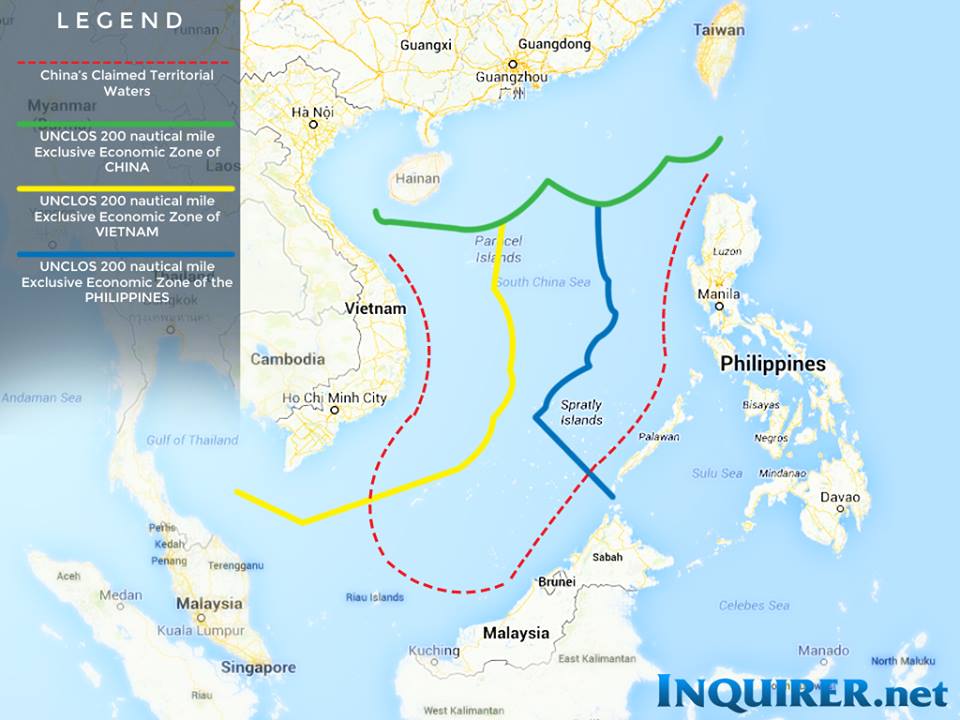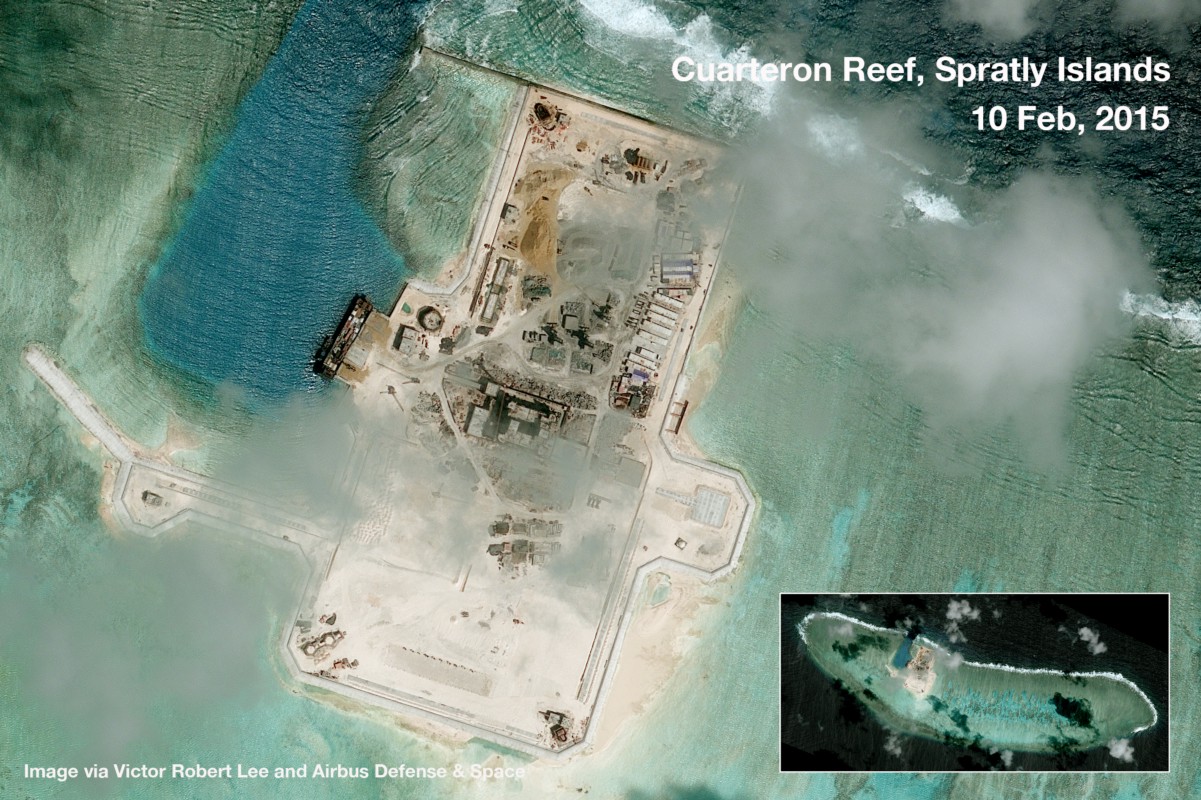Key points of the Arbitral Tribunal’s first ruling in Philippines vs China case

Hearing on Jurisdiction and Admissibility in session, July 2015, Peace Palace, The Hague. Philippine Secretary for Foreign Affairs, Albert F. Del Rosario (center) addressing the Arbitral Tribunal. China’s table (right) is empty as they have declined to participate in the proceedings. PHOTO FROM THE PERMANENT COURT OF ARBITRATION
The international Arbitral Tribunal on Thursday decided on several issues in the maritime dispute case between China and the Philippines over the South China Sea (West Philippine Sea), majority of which involved rejecting China’s arguments.
BACKSTORY: Philippines scores against China in UN arbitration
The Tribunal’s decisions were unanimous, shutting down several of China’s statements against the arbitration case.
In a 10-page summary, The Tribunal said that the case “was properly constituted” and that “the Philippines’ act of initiating this arbitration did not constitute an abuse of process.”
China has repeatedly asserted its position that it will not participate in the proceedings because the Tribunal has no jurisdiction over China’s “territorial sovereignty over several maritime features in the South China Sea.”
Article continues after this advertisementChina also said that the Philippines abused the Arbitration mechanism under the United Nations Convention on the Law of the Sea (UNCLOS) because it unilaterally initiated the proceedings without first exhausting diplomatic channels.
Article continues after this advertisementBut the Tribunal rejected China’s arguments saying that “China’s non-appearance in these proceedings does not deprive the Tribunal of jurisdiction,” and “the Tribunal held that the Philippines had sought to negotiate with China and … international law does not require a State to continue negotiations when it concludes that the possibility of a negotiated solution has been exhausted.”

Philippine delegation to the United Nations Arbitral Tribunal in The Hague. PHOTO FROM THE DEPARTMENT OF FOREIGN AFFAIRS
Jurisdiction over 15 submissions
Since the case began back in January 2013, the Philippines had presented its position on 15 items relating to the hotly contested and resource-rich waters west of the Philippines.
The Tribunal decided it was the proper body to decide on seven of the Philippines’ submissions, while seven others were reserved for further consideration because those issues “do not possess an exclusively preliminary character.”
The Philippines was directed to “clarify the content and narrow the scope” of its 15th submission which states that “China shall desist from further unlawful claims and activities.”
The following are the seven points of the Philippines which will move forward to the merits phase:
(1) Scarborough Shoal generates no entitlement to an exclusive economic zone or continental shelf;
(2) Mischief Reef, Second Thomas Shoal and Subi Reef are low-tide elevations that do not generate entitlement to a territorial sea, exclusive economic zone or continental shelf, and are not features that are capable of appropriation by occupation or otherwise;
(3) Gaven Reef and McKennan Reef (including Hughes Reef) are low-tide elevations that do not generate entitlement to a territorial sea, exclusive economic zone or continental shelf, but their low-water line may be used to determine the baseline from which the breadth of the territorial sea of Namyit and Sin Cowe, respectively, is measured;
(4) Johnson Reef, Cuarteron Reef and Fiery Cross Reef generate no entitlement to an exclusive economic zone or continental shelf;
(5) China has unlawfully prevented Philippine fishermen from pursuing their livelihoods by interfering with traditional fishing activities at Scarborough Shoal;
(6) China has violated its obligations under the Convention to protect and preserve the marine environment at Scarborough Shoal and Second Thomas Shoal;
(7) China has breached its obligations under the Convention by operating its law enforcement vessels in a dangerous manner causing serious risk of collision to Philippine vessels navigating in the vicinity of Scarborough Shoal;
BACKSTORY: UNCLOS explained: Why China’s claims in South China Sea are invalid

This map shows the UNCLOS-mandated 200-nautical-mile Exclusive Economic Zone for Philippines, Vietnam and China as well as the nine-dash line claim asserted by China.
The Convention
Under the United Nations Convention on the Law of the Sea (UNCLOS) a state needs to have land before they can claim rights to the sea.
“You need to have land before you can have rights to the sea. It’s as simple as that.You cannot just have rights to the sea without owning land,” former Solicitor General Francis Jardeleza said in a forum at the University of the Philippines (UP) Law Center in 2014, citing the basic principle of UNCLOS.
China asserts it has “indisputable sovereignty” and “historic rights” to nearly the entire South China Sea using its “nine-dash line” claim that overlaps with the UNCLOS-mandated 200-nautical-mile Exclusive Economic Zone (EEZ).
In recent months, China has conducted massive land reclamation activities turning submerged reefs into artificial islands capable of hosting military equipment and structures.
PHOTOS: China’s construction of military bases in Spratlys
Further hearings
The Tribunal has not issued a decision on its jurisdiction on the following seven points of the Philippines saying that they will schedule further hearings “to present oral arguments and answer questions on the merits of the Philippines’ claims and any remaining issues deferred from the jurisdictional phase.”
(1) China’s maritime entitlements in the South China Sea, like those of the Philippines, may not extend beyond those permitted by the United Nations Convention on the Law of the Sea (“UNCLOS” or the “Convention”);
(2) China’s claims to sovereign rights and jurisdiction, and to “historic rights,” with respect to the maritime areas of the South China Sea encompassed by the so-called “nine-dash line” are contrary to the Convention and without lawful effect to the extent that they exceed the geographic and substantive limits of China’s maritime entitlements under UNCLOS;
(3) Mischief Reef and Second Thomas Shoal are part of the exclusive economic zone and continental shelf of the Philippines;
(4) China has unlawfully interfered with the enjoyment and exercise of the sovereign rights of the Philippines with respect to the living and non-living resources of its exclusive economic zone and continental shelf;
BACKSTORY: Chinese coast guard harassing PH ship at Ayungin Shoal
(5) China has unlawfully failed to prevent its nationals and vessels from exploiting the living resources in the exclusive economic zone of the Philippines;
(6) China’s occupation and construction activities on Mischief Reef
(a) violate the provisions of the Convention concerning artificial islands, installations and structures;
(b) violate China’s duties to protect and preserve the marine environment under the Convention; and
(c) constitute unlawful acts of attempted appropriation in violation of the Convention;
(7) Since the commencement of this arbitration in January 2013, China has unlawfully aggravated and extended the dispute by, among other things:
(a) interfering with the Philippines’ rights of navigation in the waters at, and adjacent to, Second Thomas Shoal;
(b) preventing the rotation and resupply of Philippine personnel stationed at Second Thomas Shoal; and
(c) endangering the health and well-being of Philippine personnel stationed at Second Thomas Shoal;
Final decision
The Tribunal said that it will set further hearings to discuss merits and the jurisdiction of remaining issues and that it expects to be able to make a final decision in 2016.
RELATED STORIES:
China: We are the victims in dispute; won’t heed UN decision
The heart of the dispute over the West PH Sea
Maritime affairs expert separates facts from fiction on Scarborough Shoal
RELATED VIDEOS
